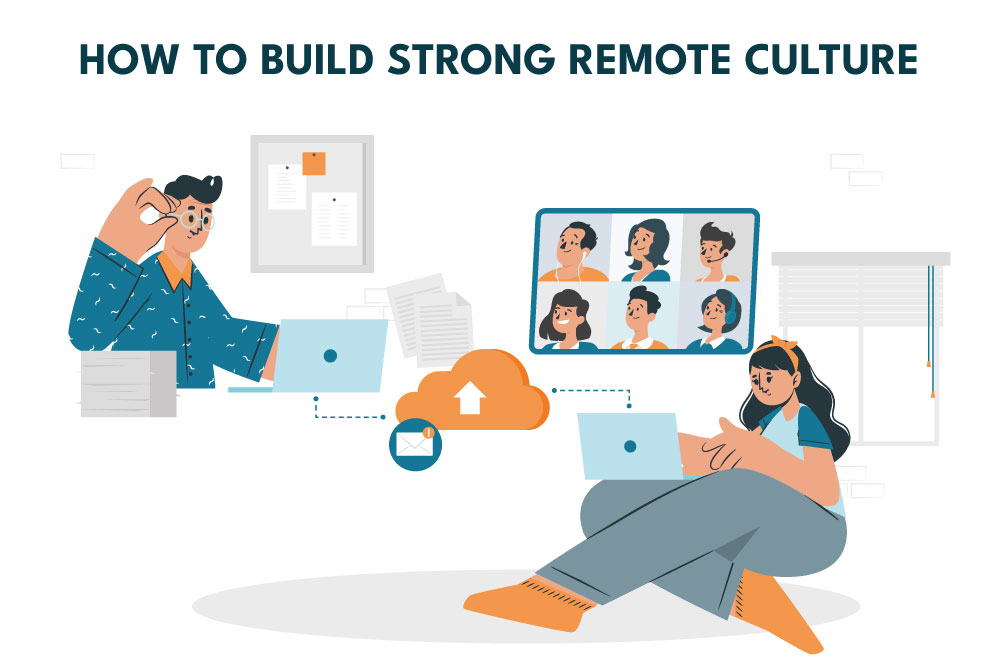How to Build Strong Remote Culture?
Is building a strong remote culture as important as setting up a remote workforce? Yes, Remote culture relies on a company’s value, goal, mission and a clear definition of what success means to them as an individual and as an organisation. At offices, work culture evolves organically through teamwork, brainstorming, and collaboration. But, when building a remote team you have to rethink the process of creating a remote culture. This process should begin with recruiting, and continue through collaborations and team work. A workplace culture can not be built overnight, and is a continuously evolving process that demands effort and empathy. This article aims to guide you with tips to build a strong and productive remote culture against all odds.

Ways to Build a Strong Remote Culture
1. Recruit apt candidates
Remote work hiring arrangements are built on mutual trust and communication between the candidate and the recruiter. All parties should be aware of remote position responsibilities and expectations. Not all personnels are fit for remote mode work. A remote worker should be self-motivated, disciplined, respectful, and behave based on the company norms. Adaptability, accountability, responsibility and empathy are to name a few ethics that a remote team should practice for a better environment. So the recruitment team should verify the candidate’s skills, work background, project experiences, abilities to build a strong remote culture and team for their organization.
2. Communication for effective collaboration
Team members who communicate well are more likely to help each other, complete tasks before delivery, and work successfully in every aspect. Communication includes words, tones, body language, etc. Workers who communicate respectfully, politely, and efficiently with one another will do their work better. Building effective communication through virtual face-time calls between global employees will increase productivity, collaboration, and build a diverse work culture. You can also prefer occasional in-person team meets for the remote employees who work on nearby locations to promote strong remote culture.
3. Virtual Chat Rooms
Due to the pandemic, companies were forced to shut down their offices and switch to remote work. To make the work process easier, numerous tools are available for communication, management, and monitoring employee’s work performances. Discussed below are some popular tools – Slack, Zoom, Bonusly.
Slack – Slack helps you to collaborate with the team for single-thread communication. You can share files, text, images, multimedia files through channels with your own encryption keys to personalize real-time experience.
Zoom – One major problem with remote teams is that it is impossible to have person-person interaction. Zoom is a corporate tool designed for virtual face-time meetings where you can conduct long meets with 500 people at a time. They are well known for their video quality and ease of streaming across devices.
Bonusly – Bonusly is a recognition and reward platform to appreciate and boost up remote talents for their dedication and effort. Through Bonusly, organizations like Amazon, Uber publicly recognize and reward with small bonuses or tips as a means to encourage their employees.
4.Ensure credibility and Security
Create a dedicated and strong remote culture by improving the employer’s credibility of understanding their wants and needs. It is possible only through the proper communication and collaboration regarding their roles, projects, deadlines, expectations. Be clear with workflow ideas, agenda, and other important information before the onset of team discussion. Remote workspace may look safe and secure, but there is a chance of cyber security attack. To get rid of the risk, pay attention to sharing secured data through personal devices such as RDP and store it in device storage rather than cloud space. Educate the remote workers with basic network security functions to eliminate the hacking.
5. Work on your Feedbacks
Building a strong remote culture is an iterative process and takes time. The feedback and employer perspectives will help you to organize your remote work strategy effectively. Collecting feedback through tools like Kappi, and working on it will help your employees understand that you are working on improving and encourage them to do the same. Remote culture evolves by identifying and handling bottlenecks for better interaction and team spirit. Feedback is a combination of alphabets and expressions so provide them with context, details or else the exchange of thoughts may result in aggressive comments between virtual teams. Make sure that your team follows the right language to address feedback to avoid misunderstandings and conflicts later.
Final Thoughts
Rather than focusing on creating a remote culture, focus on creating a sustainable and safe space for your employees so they can adapt easily when and if required to switch to remote teams. Building a trustworthy remote culture is a tedious and ongoing process. In the post pandemic new normal, businesses are implementing the idea of a hybrid model i.e) Half of the employees as in-house developers, and another half as remote developers. Or work from the office on particular days and from homes the other days. With that being said, our Centizen Talent hub team, we help find the right candidates for your job roles from across the globe. By applying the above guidelines, you can set up a strong and positive remote culture for sustained growth and productivity.
Centizen
A Leading IT Staffing, Custom Software and SaaS Product Development company founded in 2003. We offer a wide range of scalable, innovative IT Staffing and Software Development Solutions.
Contact Us
USA: +1 (971) 420-1700
Canada: +1 (971) 420-1700
India: +91 63807-80156
Email: contact@centizen.com
Our Services
Products
Contact Us
USA: +1 (971) 420-1700
Canada: +1 (971) 420-1700
India: +91 63807-80156
Email: contact@centizen.com






